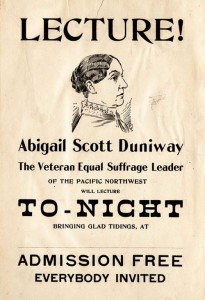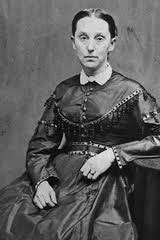In the second half of the nineteenth century, a young woman who would later lead Oregon’s women voters to the polls came to the Willamette Valley by wagon train.
Abigail Jane Scott (1834-1915) moved to Lafayette in 1852 with her father and eight siblings, her mother died along the trail.
Not long afterward, Abigail moved to Eola (then called Cincinnati) to become the first schoolteacher of the new school.
Her own formal education consisted of a few months of sporadic classroom attendance and an old speller that she brought with her along the Oregon Trail.
It is in Eola where she met Benjamin Duniway, whom she married on Aug. 2, 1853, acquiring the name that she is known by today; Abigail Scott Duniway; Oregon’s leading suffragist.
Benjamin obtained 320 acres of donation land in the southern area of Clackamas County near the Molalla River where he raised livestock, hunted game and grew wheat.
During that time, donation land was granted to people moving to Oregon who vouched to work the land for four years.
In this sparsely populated area, Abigail gave birth to their first child, Clara Belle, just shy of 10 months after their wedding date.
Besides nursing and caring for her baby, Abigail’s days were filled with endless tasks such as feeding pigs, milking the cow, churning butter, making preserves, pickling, salting meat, baking bread, making soap and candles, as well as laundering and cooking for the hired hands and the numerous bachelor ranchers to whom Benjamin enjoyed exhibiting his wife for admiration.
Though the days were long and wrought with duties, Abigail still found time to write stories, which she read to the delight of their company.
Not long after the difficult birth of their second child of six in 1856, the Duniways’ home burned down and they moved in with family nearer to what has been referred to as “Silverton Country” by Robert Horace Down.
In his 1926 book, “A History of the Silverton Country,” Down includes the Waldo Hills, parts of Howell Prairie, North/East to Butte Creek and the towns of Mount Angel, Scotts Mills, and Monitor as “Silverton Country.”
It is here that Abigail taught a term each at Butte Creek and Needy schools.
Being an avid reader of newspapers and novels, coupled with her involvement in the community and having the experience of what she often termed a “hardscabble” life, it is likely that Abigail endowed her students who would be the future women voters of Silverton Country with not only standard educational exercises, but also such controversial ideas as the importance of a woman having the rights to own property, earn money, marry wisely, vote and maintain reproductive control of her own body.
In “Path Breaking, an Autobiographical History of the Equal Suffrage Movement in Pacific Coast States,” Abigail describes her four years on the donation land as “a hospitable neighborhood comprised chiefly of bachelors, who found comfort in mobilizing at meal times at the homes of the few married men of the township…I, if not washing, scrubbing, churning, or nursing the baby, was preparing their meals in a lean-to kitchen.”
It is in Silverton Country that Abigail Scott Duniway first felt the stirrings toward woman’s suffrage taking on a new life as she began to work on what was to later become the first novel ever commercially printed in Oregon, Captain Gray’s Company, or Crossing the Plains and Living in Oregon (April, 1859).
Though the book was not received by the general public with high regard – in fact it basically flopped – Abigail was encouraged by the endeavor nonetheless; going on to author the first Woman Suffrage Proclamation ever written by a woman’s hand 53 years later.
This later success led her to encourage others who may read her autobiography, Path Breaking, with the words, “Do not yield to difficulties, but rise above discouragements.”
When their four years on the donation land were behind them, the Duniway’s moved to Lafayette, where they met hard times.
In 1861, a flood ruined their harvest, making it impossible for Benjamin to pay on the notes he had signed for a friend.
In 1862, he was thrown from a team of horses and crushed by the wagon, injuring him to the point where he was resigned to only light work for the rest of his life.
Abigail again began teaching, and 1864 the Duniways moved to Albany where Abigail supported the family first as a teacher, then as a successful shop owner, selling millenary and notions.
In 1871, they moved to Portland where she began the publication of a human rights newspaper, The New Northwest and thrust herself into a suffrage movement that would take her more than 40 years to succeed at and cost her more than $42,000.
Before beginning The New Northwest, Abigail invited leading suffragists of the East to come to the Northwest and “give the cause an impetus.”
After the paper was launched, Susan B. Anthony did indeed meet Abigail Scott Duniway in Portland and they traveled together to greet and speak to audiences in Oregon, Washington Territory, and Victoria, British Columbia.
They traveled by stagecoach, steamer, wagon, carriage, on horseback and by rail, to meet anywhere a group could gather such as churches, schools, saloons and pool halls.
Even after Susan B. Anthony returned to her home in the East, Abigail maintained this sort of speaking schedule and was able to keep The New Northwest in publication for 16 years despite the fact that her brother, Harvey Scott, was the editor of The Oregonian and a staunch anti-suffragist.
Though Silverton Country has changed quite a bit in the past 150 years, there are some things that Abigail Scott Duniway may have had a part in inspiring among the citizens of the area.
People are still active in their community, hard working, expressive in the fine as well as tactile arts, they can still be found helping their neighbors, speaking their minds, can be tenacious, and they do not take their right to vote for granted.
